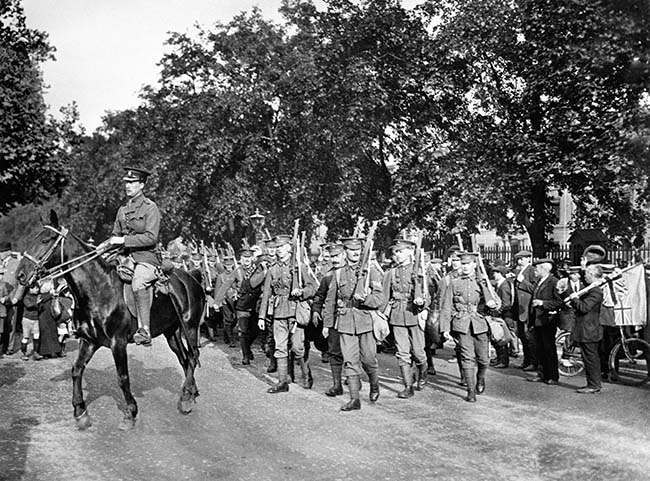When
one asks a German about their feelings toward their country and their people,
one will often gather that Germans take a great deal of pride in being from
Germany and being part of the German community. And to us, that might seem
funny. The most prevalent impressions of Germans among Americans is the idea
that Germany is just a country where everyone drinks copious amounts of beer
and gets drunk all the time, as well as a country full of Nazis. But when
everyone else thinks of America, they think of people who love having guns,
love to be gluttons, refuse to share their wealth and think that everything
revolves around them. No wonder they think it’s strange when we take pride in
our country. But what we must understand is why they take great pride in their
own country.
Let’s start at the beginning of
World War I. At this point, Germany believed that it was an unstoppable world
power. The people were prideful to the point of being foolish. On page 191 of
Hagen Schulze’s Germany: A New History,
Kaiser Wilhelm II is quoted on August 4th, 1914, saying “I do not
recognize parties any longer, I recognize only Germans.”
The text then goes on
to say that Wilhelm’s statement “helps to explain the general public’s
jubilation at the outbreak of the First World War in Germany…” and that this
jubilation “was not unlike the demonstrations of mass enthusiasm in London,
Paris and St. Petersburg.” The Germans not only supported their soldiers in
their upcoming efforts, but they believed that they could not be defeated.
However, by July 17th, 1917, the majority in the German Parliament
declared itself in favor of a peace treaty. By November 11th, 1918,
Germany had officially signed the armistice that ended World War I.
Unfortunately the damage of the war was too severe for the people to have any
sort of sympathy towards the government. They may have ended World War I, but
they could not avoid starting a civil war.
 |
| http://www.anorak.co.uk/wp-content/uploads/2013/08/PA-1142522.jpg German soldiers parading to war while civilians cheered them onward. |
Eventually, after years of political
unrest within Germany, the economy began to flourish. So why was there still a
lack of support for the new government? The brutal truth was that the economy
was not flourishing in the eyes of those who remembered life before the war. On
page 219, Schulze explains how people noticed that the best year for the
economy fell far short of the mark set by even the worst years preceding the
war. How could this be? The Germans grew curious and began to question the
leadership of their government.
Around this time, The NSDAP (more “affectionately”
known now as the Nazi party) came to power in the Government, while all efforts
at democracy began to fail. This soon led to Hitler’s rise to power and a sense
of false hope for the populace, as democracy around Europe was falling apart
and dictatorships gave off a glimmer of hope.
 |
| Images taken from Google Images Dictatorships seemed all the rage in 1930's Europe. Here are the three most prominent faces of European dictatorships. |
Hitler’s coming to power was the
beginning of a very different identity for the Germans. Many Germans publicly supported
the new government and took pride in become such a pure and superior nation
(the rise of the Aryan race), but within the privacy of their own homes and
private conversations, shared their true feelings of opposition. A fair
comparison could be made between the new Nazi government and the book, 1984, known most popularly by its
concept of a powerful ruler, known as “Big Brother,” capable of hearing and
seeing everything that went on within the boundaries of the country, as well as
eliminating all of those who were deemed threats to the goals of the state
(i.e. political opponents). As this blind sense of national pride came about,
World War II began and Hitler’s government soon fell, along with the façade put
up by the Germans who were not targeted by the state.
After watching their
country suffer the harsh consequences of a loss in such brutal wars as both World Wars, the German nation began to see
that it could no longer blindly follow and support a government of totalitarian
control, such as the Nazi government or the days of the Kaiser. Germany would
need to develop a government based on democracy. Germany would need to refrain
from giving one person so much control over the country. Germany would need to
think more critically before taking such drastic actions as fighting a war in
which they cannot afford to be a participant. Most importantly, though, the
people of Germany would need to take pride in who they were now, regardless of
where the country had been before or where the country was headed.









